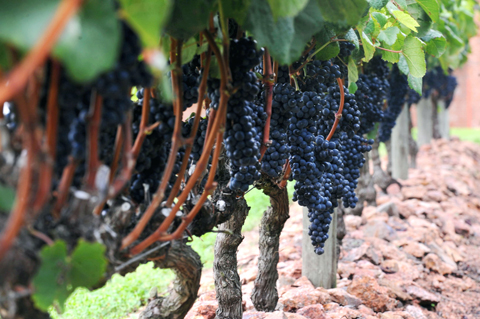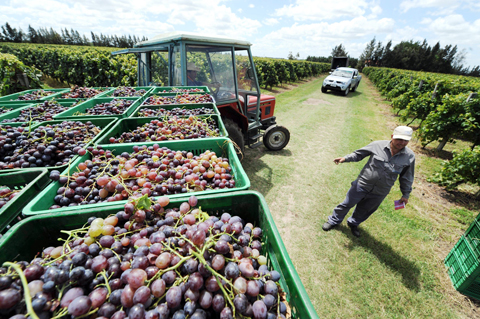Argentina has its Malbec. Chile has its Carmenere. Now Uruguay, not to be out-muscled by its more famous wine-producing neighbors, is taking the world of viticulture by storm, with its distinctive Tannat wines.
Uruguay, the fourth most important wine-producing country in South America, grows a variety of grapes, but none more celebrated than Tannat, which is fueling this tiny country’s rise to prominence in the wine world.
Over the years, Tannat has come to be seen as the quintessential Uruguayan grape and wine, representing about 40 percent of the country’s entire wine production.

PHOTO: AFP
Now bold and full-bodied Tannat wines are putting upstart Uruguay on the map and winning prizes against competition fronted by more established regional rivals.
“Tannat is opening doors for us,” winegrower Virginia Stagnari proudly said.
Her Italian immigrant family founded the Antigua Bodega Stagnari, some 20km north of Montevideo, one of the country’s leading vineyards.

PHOTO: AFP
Although Uruguay’s wines are just beginning to gain a global foothold, it has a long history of viticulture, dating back some 250 years when French and Spanish immigrants brought the vine to the New World.
The hardy Tannat grape, originally from southeastern France, was introduced to Uruguay in 1870 by the Basque Frenchman Pascual Harriague, an immigrant who was looking for a varietal that would thrive in Uruguay’s soil and climate.
Since the 1990s, Uruguay has been exporting high quality wine throughout Latin America, the US and even in the countries of the Gulf.
This tiny country of some 3.4 million inhabitants, dwarfed by its larger neighbors Brazil and Argentina, now enjoys a growing reputation as a producer of superlative wines for a reasonable price.
Some 8,200 hectares of vineyards have been cultivated by about 1,800 wine producers.
Stagnari said her family’s vineyard was established in 1929 by her maternal grandfather, an immigrant from Italy, and today produces 140,000 liters of various types of wine, exporting every fifth bottle out of the country to destinations such as Brazil, Mexico, Belgium and Sweden.
Another highly regarded label here, Bouza, although barely a decade old, produces what are generally deemed to be some of this country’s most exquisite wines, including not only Tannats, but varietals such as Albarino, Chardonnay and Merlot.
To obtain top quality wines “we have to expend a lot of man-hours,” said the company’s resident eonologist, Eduard Boido.
The quest for memorable wines also means “maintaining the biodiversity of the vineyard,” Boido said, as well as cultivating the grapes “in parcels of land no larger than a half-hectare in size.”
Small scale viticulture allows for quality control and ensures the “traceability” of each bottle — something that Uruguay’s industry overseers INAVI, the national institute of wine culture, insists upon.
INAVI says Uruguay exported 1.2 million liters of wine in 2004, with a value of some US$3.3 million. In 2008, it sold 13.4 million liters valued at US$10.6 million.
Viniculture in Uruguay was dealt a major setback by the global financial crisis, however. Last year, it succeeded in selling only 2 million liters, valued at about US$6 million.
Uruguay expects to make up lost ground quickly now that the economic recovery is underway, but even the most avid oenophiles agree that Uruguay’s wine industry will rise and fall on the quality of each individual bottle of ruby red Tannat.

SECURITY: As China is ‘reshaping’ Hong Kong’s population, Taiwan must raise the eligibility threshold for applications from Hong Kongers, Chiu Chui-cheng said When Hong Kong and Macau citizens apply for residency in Taiwan, it would be under a new category that includes a “national security observation period,” Mainland Affairs Council (MAC) Minister Chiu Chui-cheng (邱垂正) said yesterday. President William Lai (賴清德) on March 13 announced 17 strategies to counter China’s aggression toward Taiwan, including incorporating national security considerations into the review process for residency applications from Hong Kong and Macau citizens. The situation in Hong Kong is constantly changing, Chiu said to media yesterday on the sidelines of the Taipei Technology Run hosted by the Taipei Neihu Technology Park Development Association. With

CARROT AND STICK: While unrelenting in its military threats, China attracted nearly 40,000 Taiwanese to over 400 business events last year Nearly 40,000 Taiwanese last year joined industry events in China, such as conferences and trade fairs, supported by the Chinese government, a study showed yesterday, as Beijing ramps up a charm offensive toward Taipei alongside military pressure. China has long taken a carrot-and-stick approach to Taiwan, threatening it with the prospect of military action while reaching out to those it believes are amenable to Beijing’s point of view. Taiwanese security officials are wary of what they see as Beijing’s influence campaigns to sway public opinion after Taipei and Beijing gradually resumed travel links halted by the COVID-19 pandemic, but the scale of

A US Marine Corps regiment equipped with Naval Strike Missiles (NSM) is set to participate in the upcoming Balikatan 25 exercise in the Luzon Strait, marking the system’s first-ever deployment in the Philippines. US and Philippine officials have separately confirmed that the Navy Marine Expeditionary Ship Interdiction System (NMESIS) — the mobile launch platform for the Naval Strike Missile — would take part in the joint exercise. The missiles are being deployed to “a strategic first island chain chokepoint” in the waters between Taiwan proper and the Philippines, US-based Naval News reported. “The Luzon Strait and Bashi Channel represent a critical access

Pope Francis is be laid to rest on Saturday after lying in state for three days in St Peter’s Basilica, where the faithful are expected to flock to pay their respects to history’s first Latin American pontiff. The cardinals met yesterday in the Vatican’s synod hall to chart the next steps before a conclave begins to choose Francis’ successor, as condolences poured in from around the world. According to current norms, the conclave must begin between May 5 and 10. The cardinals set the funeral for Saturday at 10am in St Peter’s Square, to be celebrated by the dean of the College